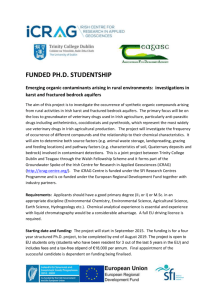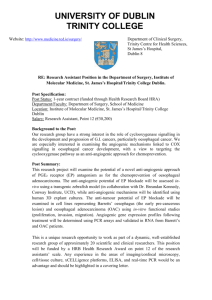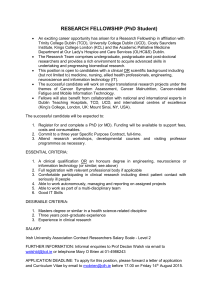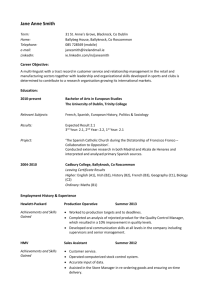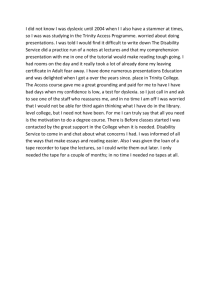Exam Revision Tips - Trinity College Dublin
advertisement
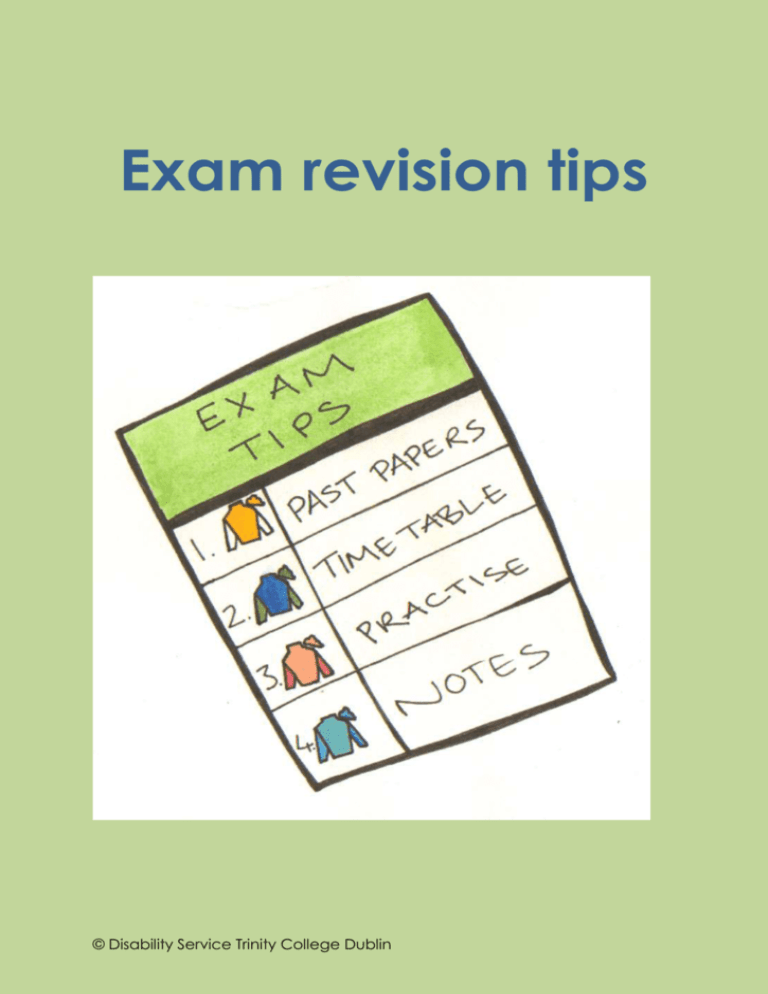
Exam revision tips © Disability Service Trinity College Dublin 6 ways to enhance your revision: • By reading past papers to familiarize yourself with the format of the exam. • By collecting information and preparing notes on modules you have studied. • By making a revision timetable that is appropriate and realistic. • By making revision aids for use individually or with study buddies. • Practice writing exam essay answers. • Make use of on line revision and study tools. Past exam papers are available electronically from the library website. Go to the library main page and from the tool bar across the top select Services and Facilities. On the left hand side menu select Exam Papers. You can search by course, examination year and undergraduate year group. You should try to condense any notes you have, making a mindmap is a good way of identifying what information you need to gather. You can also use it as a memory aid in the examination. Try and re-create it in the back of your answer book. © Disability Service Trinity College Dublin If you are a visual learner using post it notes can be very effective. For example this post it note is a memory aid for Maslow’s Hierarchy of Needs: Maslow: HON – 5 SA E L/B S P Place the post its around your living space in locations where they will frequently catch your eye, for example beside the kettle, on your wardrobe door, beside the mirror, on the wall going up the stairs. When you are in the exam you can recall these in your mind’s eye. If you condense notes into revision quiz cards they can be used with friends and family. © Disability Service Trinity College Dublin If you are an auditory learner you may benefit from recording your condensed notes as mp3s. If you do not wish to do this using a dictaphone, Texthelp Read and Write Gold and Robobraille are two electronic tools that will do this for you. For further information please watch our presentation on Converting Text to Speech: Using Texthelp Read and Write Gold and Robobraille. Revision timetables are essential. Students often under or over revise material, sometimes avoiding topics they are less confident about, or over revising some topics at the expense of others. You can download printable timetables from the internet, and a sample is available in the back of this leaflet. © Disability Service Trinity College Dublin The important point is to be realistic about start and finish times. You should also factor in rest breaks, and vary the materials you are revising. Monday Tuesday 10 - 11 Intro to Review economics yesterday 11 - 12 Intro to Soc Intro to economics Wednesday Thursday Review yesterday Maths and stats Friday Review Review yesterday yesterday Intro to Intro to Soc Law 12 - 1 Maths and Organisation Intro to Soc stats and Mgmt 1-2 Lunch Lunch Lunch Language Intro to economics Lunch Lunch 2-3 Intro to Law Intro to Pol Sc Intro to Pol Organisation Sc and Mgmt 3-4 Language Free choice Organisation Language Maths and and Mgmt stats 4-5 Read through today’s notes Read through today’s notes Intro to economics Read through today’s notes Read through today’s notes Read through today’s notes Online revision tools are an excellent way of reviewing material, and provides a break from reading printed material. The following are just some examples of internet material. TCD iTunes hosts a number of podcasts: © Disability Service Trinity College Dublin You can type key words into You Tube or Google, for example if you are studying Psychology enter ‘spss tutorials’. The Learning support service provides academic workshops throughout the year, and details are available from their website. You can also book an appointment if you need individual advice. © Disability Service Trinity College Dublin Student Learning Services provides a very useful web centre to help you with all aspects of academic work. We would advise you to bookmark this web address into your web browser. http://www.tcd.ie/Student_Counselling/student-learning/undergraduate/ Student Learning Services provide academic workshops throughout the year, and an online study skills seminar. You also have access to modules on revision and exams through Skills4Study Campus (www.tcd.ie/local) © Disability Service Trinity College Dublin Practising exam essays Read past papers. Familiarize yourself with the format of the exam papers you will be taking. Prepare likely topics, key themes or issues. Decide these from information you have obtained from your lecture or study guide notes, lecturers, tutors, past exam papers, etc. When studying, focus on key words and phrases that you should include. Collect relevant information on the topic including definitions, factual statements, evidence, examples, information from assigned readings, opinions, etc. Organize the information you have collected under theme headings. © Disability Service Trinity College Dublin Practice writing answers to questions you are likely to be asked. Sort out the main points you will want to make (should you get asked that particular question) and practice recalling them in the right sequence. © Disability Service Trinity College Dublin

